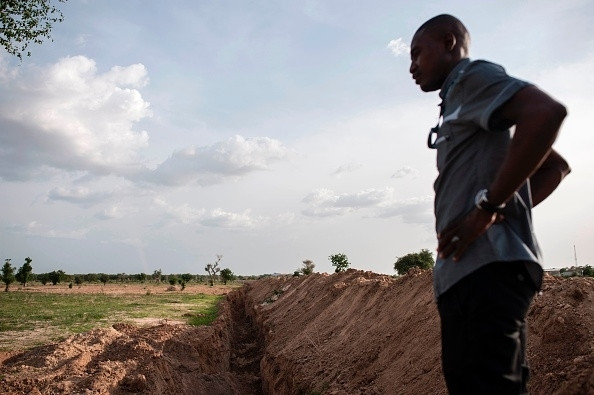A university in Nigeria had to dig trenches to protect staff from Boko Haram
University in Maiduguri, epicentre of Boko Haram's insurgency, targeted at least eight times since January.
The Maiduguri University, in Nigeria's restive Borno state, is digging up a 27km trench in the areas surrounding the building in an effort to prevent further attacks at the hands of Boko Haram terrorists.
The university has been hit by a string of attacks and abductions in recent months, prompting dozens of staff to quit and student enrolment to drop.
At least 70 lecturers have resigned since Boko Haram's insurgency became violent in 2009, Chairman of the Academic Staff Union of Universities (ASUU) Maiduguri chapter Dani Mamma told the BBC.
The university is now digging the 2m-tall trench to prevent potential suicide bombers from entering the building. Work began in July.
Earlier this year, around 10 members of a geological research team employed at the university went missing in a suspected Boko Haram abduction.
Rescue efforts to free them resulted in dozens of deaths, prompting the federal government to temporarily halt oil exploration in the Lake Chad basin area – which includes large parts of Nigeria – until it gets security clearance.
The university has been targeted by attacks at least eight times since the beginning of 2017.
In June, the educational building was the target of multiple suicide bombings that killed at least one civillian.
In January, at least four people were killed in twin suicide bombings at the Maiduguri university. The victims include a renowned professor, Alibi Mani, killed in a blast as he performed his morning prayer at a mosque part of the university compound.
Nigeria up close: Check out our Flipboard magazine
Fight against Boko Haram

Maiduguri,Borno's capital, is Boko Haram's birthplace and the epicentre of its insurgency.
The group fights against Western influence in Nigeria and aims to impose its version of Sharia law throughout occupied territories. In 2016, the group officially formed an alliance with Isis.
The UN says at least 20,000 people have died in Nigeria and neighbouring states since the Boko Haram insurgency became violent in 2009. The conflict has also displaced at least 2.1 million people.
The group used to control total territory the size of Belgium. However, Nigeria's ongoing military operation, Lafiya Dole, and a regional offensive – consisting of 8,700 troops from Nigeria, Niger, Chad, Cameroon and Benin – have scored some successes, with soldiers recapturing key territories and releasing thousands of civilians held captive by the group.
Last year, the army claimed it had stormed Boko Haram's last known stronghold in Sambisa Forest, which the group denied.
Earlier this year, a Boko Haram faction released 82 girls who had been held captive since April 2014. The release was the result of negotiations that involved several actors, including the Swiss government.
The release suggested there could be further collaboration between the government and the group, now split in at least two factions, after Isis replaced Abubakar Shekau as leader with Abu Musab al-Barnawi, a former Boko Haram spokesperson.
The country's government and army have often claimed the fight against the insurgents is over, but violence continues.
© Copyright IBTimes 2025. All rights reserved.






















